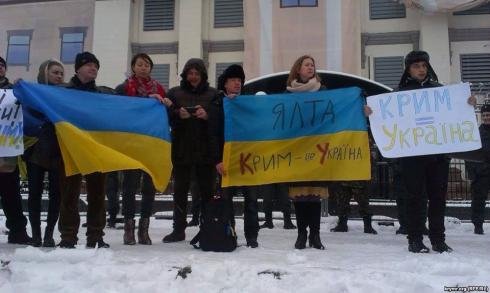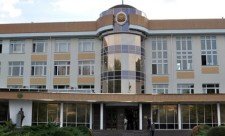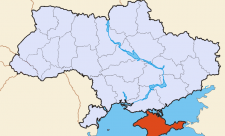 It has been a year since migrants from Crimea had adopted, probably, the historic document – the appeal to the supreme authorities of the country with the request to provide rights of IDPs – during their first all-Ukrainian Congress. What was achieved within one year and what requests remained unfulfilled? What kind of problems did the Ukrainian authorities decide to leave until later?
It has been a year since migrants from Crimea had adopted, probably, the historic document – the appeal to the supreme authorities of the country with the request to provide rights of IDPs – during their first all-Ukrainian Congress. What was achieved within one year and what requests remained unfulfilled? What kind of problems did the Ukrainian authorities decide to leave until later?
The first all-Ukrainian Congress of IDPs from Crimea took place on May 23, 2014 in Kiev. According to the results of the Congress, its attendances adopted a range of important documents with suggestions and requests regarding legalization of the status and actions of the IDPs on mainland Ukraine and requests to the state authorities to affect on their destiny. By the way, the very adoption of the term “internally displaced persons” was also initiated while this historic meeting.
Internal migrants addressed their requests to the president of Ukraine, deputies of the Verkhovna Rada, prime-minister and the Cabinet of Ministers, the National bank of Ukraine and self-governing authorities. However, let us consider every case in order of appearance.
President of Ukraine
Migrants had only one request to the president Petro Poroshenko: to acknowledge the top-priority of draft laws regarding the IDPs and submit them for approval before the end of the fourth session of the 7th Verkhovna Rada.
By September 2014, 8 draft laws regarding provision of IDPs’ rights, most of which had been denied after beginning of the work of the 8th Verkhovna Rada, have been submitted for approval of the legislative body and the president.
There are the Draft Law on provision of rights and freedoms of citizens – IDPs (registered on June 3), Draft resolution on provision of higher education for enrollees from the Lugansk and Donetsk regions (June 16), Draft Law of Ukraine on the legislative status of entities forced to leave places of residence as a result of the temporary occupation of the Autonomous Republic of Crimea and city of Sevastopol and circumstances connected with the conduction of the anti-terroristic operation in the territory of Ukraine (June 19, vetoed by the President), Draft Law on amendments to the Internal Revenue Code of Ukraine regarding taxing physical entities’ incomes that were received as a fringe benefit by taxpayers, who suffered in result of military hostilities, warfare operation conduction and migrated from the occupied territory and territories on which combat actions or militaries operations were conducted (June 17), Draft Law on amendments to the Law of Ukraine “On the Cabinet of Ministers”(regarding the imperative creation of the Ministry in the matters of Crimea and internally displaced persons of Ukraine) (July 21), Draft Law of Ukraine on amendments to the Law of Ukraine “On the preschool education” (regarding provision of IDPs’ needs and formation of the preschool educational institution groups) (July 30), Draft Law on amendments of the Internal Revenue Code of Ukraine (regarding remission of taxes on the income received in forms of humanitarian aid, charity support, technical help received by IDPs) (August 28), Draft Law on amendments to the Custom Code of Ukraine (regarding reduction of the temporary storage term of humanitarian aid goods for IDPs) (August 28), Draft Law on provision of rights and freedoms of IDPs (August 28) among these legislative initiatives.
“To determinate draft laws that guarantee high priority provision of rights and freedoms of IDPs from Crimea and submit them for approval out of sequence to enable their immediate adoption before the end of work of the current session of the Verkhovna Rada of Ukraine,” the appeal of the migrants says at the first Congress.
Draft laws regulating issues raised by the migrants were prepared rather efficiently (by means of migrants themselves as well), but their consideration and adoption were deliberately put off by the Verkhovna Rada, however, it didn’t bother the 7th Verkhovna Rada to adopt the main law “On the provision of rights and freedoms of IDPs” by the end of the tenure.
The Verkhovna Rada
So, the first conditional set of requests to deputies concerned regulation of the migrants’ status and creation of the mechanism to protect rights, freedoms and social rehabilitation of the IDPs.
Migrants wanted concessionary land granting, rights for subsidies and soft long-term loans, amending of legislation that would allow them to enter information to the certificate of a migrant and not to the internal passport of Ukraine.
Concessionary fares for land granting and long-term loans were affirmed in the law “On provision of rights and duties of internally displaced persons”.
The Verkhovna Rada adopted this law (the draft law was in Rada since August 28) by 246 votes, from the second try on October 20, but the president signed it on November 19, 2014. For that moment, according to the data of the Emergency Situations State Service of Ukraine, there were already 436 thousand migrants from Crimea and the East of the county (data as of October 26).
The second set of requests concerned representation of migrants in the state government bodies. Thus, at the Congress it was requested: to include representatives of migrants to the working groups under the Verkhovna Rada of Ukraine committees working at the relevant draft laws; to create the Committee of the Verkhovna Rada of Ukraine in the matters of the Autonomous Republic of Crimea; to consider legislative arrangements for conducting off-year elections to the Verkhovna Rada of Crimea and elections to the Sevastopol city council in autumn 2014; to create an expert interfactional group for protection of Ukrainian citizens from Russian pretension in Crimea.
According to the results of the Verkhovna Rada work during the year, none of these migrants’ requirements was considered. As of today, the interfactional association of deputies “Crimea” (created on December 2014), the state service in the matters of Crimea (July 17, 2014) and the State enterprise “Krymsky Dom” (May 16, 2014) deal with issues of migrants from the Ukrainian authorities. However, their efficiency, in particular, the efficiency of the “Krymsky Dom” is rather doubtful.
By the way, creation of the free economic zone in Crimea was also one of the points of the last year appeal of the migrants, which implementation was, perhaps, the fastest (the free economic zone was created on August 12, 2014), however, it’s realization caused more questions than approval.
The Cabinet of Minister of Ukraine
A lot more work has been done by the Cabinet of Ministers within the year. Thus, the executive body dealing with issues of Crimea (the State Service), “Krymsky Dom” was created, and temporary accommodations for some migrants were provided with partial settlement of the accommodation expenses by the state.
Also some Crimean authorities and law enforcement bodies restored their work on the territory of mainland Ukraine, record-keeping of migrants was organized by means of registration of migrants and issuing certificates for them with indication a residence place without changing official residential registration in passport. However, priority of the certificate with indication of the residence place in comparison with the address in passport was not articulated properly, because of what migrants faced with the necessity to receive the temporary or even the permanent registration of the residence place on the mainland (with the relevant stamp in the passport) in order to solve certain issues.
The Cabinet appealed to international organizations with a request for assistance for migrants, provided the feasibility of distance school graduation for children from Crimea with possibility of further entrance to the higher educational institutions of Ukraine.
Among steps that the Cabinet was not able to organize are printing and sending study books to the territory of the occupied peninsula. However, the question of viability of such actions in conditions of total control and pressure on the pro-Ukrainian moods of the Crimean population remains opened.
Also the government didn’t try to preserve the budget-funded working places for all migrants that used to work in that field before. It is quite possible that simply there are not enough such working places in Ukraine.
The national bank
Actually, migrants have two requests to the National Bank of Ukraine: to force banks to unblock accounts of Crimeans and allow them not to pay credit interests and penal sanctions as long as the peninsula remains occupied.
An interesting situation turned out to be here. The National Bank of Ukraine adopted three resolutions concerning migrants, two of which not only didn’t fulfill requests of Crimeans but contradicted them directly.
Thus, all entities with Crimean registration were recognized by the resolution of the National Bank of Ukraine No.699 from December 11, 2014 as non-residents of Ukraine, in other words, virtually, as foreigners that affects their relationship with banks, in particular, in the credit accommodation field. All accounts of Crimeans were blocked. After adoption of the resolution, rights defenders litigated it.
A little bit later, on November 20, 2014, the resolution of the National bank of Ukraine No.810 was adopted. According to the document, all Crimeans who have the certificate from the Migration Service of Ukraine regarding relocation and residence on the mainland part of Ukraine are considered as residents of Ukraine and do not have to prove anything extra.
However, even such a partial recognition Crimeans as citizens of Ukraine with full rights didn’t start to operate at once.
After these resolutions, many Crimeans were forced to change the permanent registration of the residence place in order to open accounts on the mainland part of Ukraine.
On November 19, another resolution was adopted (No.727) that allowed Crimeans not to pay off the capital sum and interests of the real estate loan.
On the one hand, it is possible to say that the authorities of Ukraine did a lot of work to provide migrants with the needful, especially, considering the military hostilities in Donbass. However, many draft laws, resolutions, and decisions of the authorities made within the year turned out to be ineffective or were completely impossible to implement.












